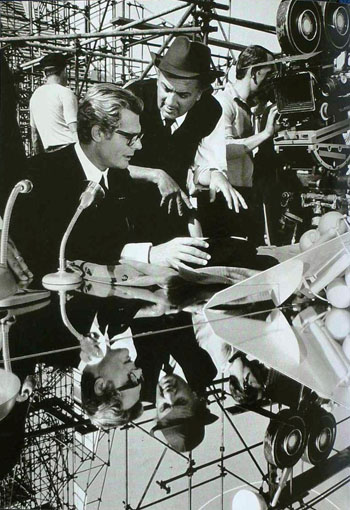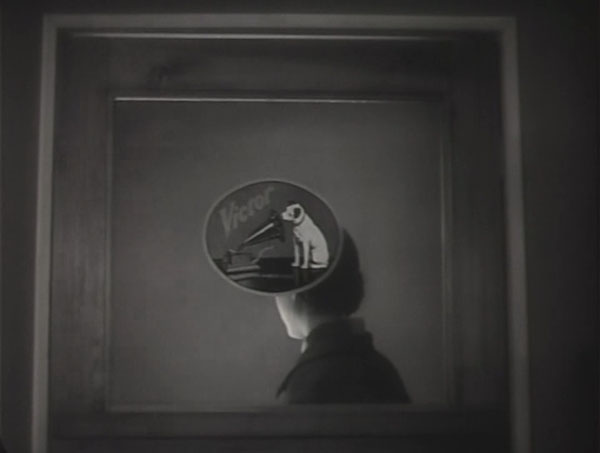“Fifty years ago—on June 25, 1963—Federico Fellini‘s 8½ had its US premiere in New York City,” notes Jon Weiner in the Los Angeles Review of Books. “To see this film in 1963 was to participate in a new cultural phenomenon in America, the European art film.”
The New Yorker‘s Richard Brody prefers to own rather than stream, but the DVD will surely, some day, go the way of the CD. He’s concerned, but not worried:
In general, the quality of film criticism has greatly increased in recent years, owing to the opening of criticism, online, to the voices of younger critics, and to the vigorous public discussion that the Internet fosters. But the ready availability of a wide range of films also helps—and the prevalence of streaming is making an ever-greater number and range of independent films available, too, with all the economic uncertainty that the world of streaming entails. It’s precisely the extreme and instant availability of work, new and old, modern and classic, that simultaneously fosters the rise of the new criticism and renders its discerning judgment—especially regarding a new generation’s new films—all the more crucial.
On a somewhat related note, Fandor CEO Dan Aronson recently spoke with J.C. Gonzo about online curation and our new feature, Journey Into Film.
Katie Kitamura has a good long conversation with Apichatpong Weerasethakul for the Asian American Writers’ Workshop. And Emma Myers interviews Xavier Dolan for Film Comment.
Glenn Kenny‘s been reading Faulkner lately and recently gave Douglas Sirk‘s The Tarnished Angels (1957), an adaptation of Faulkner’s 1935 novel, Pylon, another look. One of the arguments he makes in the resulting entry is that auteurists have rescued Sirk from a certain pigeonhole he might well slip back into if we’re not careful.
For the Paris Review, Rebecca Bengal talks with photographer Christian Patterson about his new book, Redheaded Peckerwood, which approaches the story of Charles Starkweather and Caril Ann Fugate, the real-life models for Kit and Holly in Badlands, “from a number of vantage points: newspaper clippings, interviews, ephemera.” Among the topics in the conversation is Terrence Malick and art director Jack Fisk’s use of objects and the way they, as Bengal puts it, act “as witnesses.” An exhibition of Patterson’s work opens this week at Rose Gallery in Santa Monica.
The New Yorker‘s Hendrik Hertbzberg wonders what foreign audiences will be making of World War Z: “Will they conclude that the filmmakers [are] saying that Kim Jong-un and Benjamin Netanyahu are the wisest leaders in the world, except that Kim is a little bit wiser, because he’s uncontaminated by humanitarian sentiments?”
War movies are smaller than they used to be because wars are, too, argues Walter Kirn in the New Republic.
With A Touch of Sin set for release in China later this year, Jia Zhangke is warning that “the country faces a rising tide of violence unless it tackles its social problems,” reports Tania Branigan for the Guardian.
At Artinfo, J. Hoberman notes that no one’s yet picked up on his “flip, invented term,” “Japant-Garde,” since he popped it in the title of a piece for Artforum in 1985. “Still the concept remains, as exemplified by the Tokyo 1955-70 show at MoMA last winter and as I was reminded yesterday afternoon when I had the opportunity to see Yasujiro Ozu’s 1933 Dragnet Girl.”
Producer John Wyver looks back on his “moment of digital disillusion.”
“Here is today’s bold pronouncement that I invite anyone to correct,” writes John McElwee: “Oliver Hardy was the first major film star to have come out of exhibition, and was in fact, the only major film star to have ever come out of exhibition.”
Books. The latest to review Brett Martin‘s Difficult Men is Michiko Kakutani: “He explicates the novelistic qualities of a series like The Wire and discusses how that show’s ‘Balzacian ambition to catalog every corner of its world’ (that is Baltimore) stands in sharp contrast to the more inward, psychological approach taken by The Sopranos. He argues that The Sopranos yoked together postwar literature’s ‘horror of the suburbs’ (novels like Revolutionary Road and Rabbit, Run) with what he regards as baby boomers’ ambivalence toward American capitalism (embodied, he suggests, in their fascination and repulsion with the mob, and their suspicion that ‘the American dream might at its core be a criminal enterprise’)…. Looking back at the last decade and a half, Mr. Martin argues, it’s clear that the serialized drama has matured into a distinct art form all its own, ‘the equivalent of what the films of Scorsese, Altman, Coppola, and others had been to the 1970s or the novels of Updike, Roth, and Mailer had been to the 1960s.’ Television had become ‘the dominant art form of the era.'”
For the LA Weekly, Aimee Murillo gets a few words with Robert K. Elder about his collection, The Best Films You’ve Never Seen, featuring “interviews with 35 directors, from mainstream (Danny Boyle, Kevin Smith, Guillermo Del Toro) to the more transgressive (John Waters, The Brothers Quay, Guy Maddin).” Tomorrow, Elder will be at Book Soup, talking with Brian Herzlinger about Killer Klowns from Outer Space with the film’s director, Stephen Chiodo.
FilmCraft: Screenwriting, edited by Tim Grierson, came out in April, and Indiewire‘s running an excerpt by Stephen Gaghan (Traffic, Syriana).
In other news. The Festival del film Locarno has announced that its 66th edition will open on August 7 with the international premiere of Baltasar Kormákur’s 2 Guns, featuring Denzel Washington and Mark Wahlberg, and close on August 17 with Pascal Plisson’s On the Way to School, “a French documentary screening as an international premiere. The film will be introduced by its director, and follows four children in different parts of the world—the savannahs of Kenya, the trails of the Atlas mountains in Morocco, Southern India or the plateaux of Patagonia—struggling to acquire an education.”
List. The Criticwire Network has voted on the best films of 2013 so far. The top three, in order: Before Midnight, Upstream Color, and Spring Breakers.
London. The East End Film Festival, opening today and running through July 10, “boasts a program that’s fit to burst with surprising, relevant, artistic and extraordinary work,” writes David Jenkins, introducing his interview with the programmers for Little White Lies.
Fårö. The tenth International Bergman Week is on through June 30. At Cineuropa, Jorn Rossing Jensen reports on the guest list (Noah Baumbach, Sally Potter) and the new Bergman Centre.
Obit. “Lau Kar Leung (Liu Chia Liang), one of the most revered martial artists in Hong Kong Cinema, has lost a long battle with leukemia,” reports James Marsh at Twitch. “In a career spanning more than 60 years, Lau starred in—and provided action choreography for—more than 70 films. In his early days he often collaborated with director Chang Cheh at legendary Shaw Brothers studios, and directed more than 25 feature films himself, culminating in 2003’s Drunken Monkey.”
For news and tips throughout the day every day, follow @KeyframeDaily on Twitter and/or the RSS feed. Get Keyframe Daily in your inbox by signing in at fandor.com/daily.






